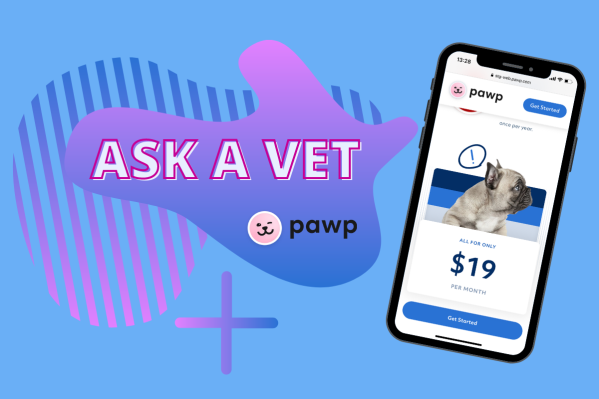Whether you’re looking for protection for your pet or answers from real vets you can trust, Pawp has you covered. Talk to an online vet 24/7 about anything and if you’re having an emergency, get access to a $3,000 safety net for vet bills. So if you’re curious or worried about your dog or cat, talk to a Pawp vet now.
Each week, Pawp Vets answer common questions from pet parents. In last week’s Ask A Vet, the vets discussed adopting younger pets and potty training. This week, Pawp’s online vets will talk about cats and dogs eating things they shouldn’t.
Ask Pawp’s Online Vets Anything
What are common signs you should talk to a vet?
While annual checkups will generally handle your pet’s overall wellness concerns, your pet may need to speak with a veterinarian in between those visits. What are some signs you need to talk to a vet? There could be a change in behavior, vomiting, diarrhea (or other changes in stool), eye issues, lethargy, changes in appetite, excessive thirst, limping, or scooting are a few. Your pets have high pain thresholds, so if they’re showing you they’re having some trouble, talk to a vet sooner than later.
Why is my dog licking her paws?
A lot of dogs lick their paws, so it’s not a problem if it’s not excessive. If it does seem to be common, it could be a sign of a larger problem. It’s important to figure out its cause before the dog’s overlicking causes a secondary bacterial infection. When it comes to what’s causing your dog’s licking, it could be food allergies, fleas, anxiety, dry skin, or obsessive behavior. Note when your dog starts licking, is after a meal? A walk outside on the grass? Only when you leave? Talk to a vet to determine the cause so you can begin solving for it.
Why does my dog eat his poop?
Although it sounds gross, it’s more common than you might think. As puppies, dogs eating their own poop is just another way they acquaint themselves with the world around them. It is more common in female dogs, as mothers tend to clean up after their puppies’ excretions. It’s also more common in houses with more pets as dogs are more likely to eat other dogs’ poop. (They have standards!) While it may not be outright dangerous, it can indicate nutrient deficiency in adult dogs or even parasites. Talk to a vet about getting your dog to stop eating poop.
Can I give my cat milk?
While the image of a cat getting its cream is very common, it isn’t accurate. Most cats are actually lactose intolerant. Cats are primarily carnivores and enjoy a protein heavy diet, which is why cat foods have fewer fillers (like grains) than dog food. Cats unfortunately have trouble digesting milk and dairy products, and providing them with these “treats” could actually end up giving them stomach problems and diarrhea. There are plenty of ways to treat your cat that don’t involve giving them a tummy ache.
Why does my cat eat my plants?
If your cat has ever munched on one of your plants or made a sprint to the grass in your yard, you know that the activity often ends with vomit. And while many cat owners believe that vomiting was the primary purpose of chewing on plants, it turns out that it’s a much older tradition that has existed in cats for thousands of years. Eating grass is common among many wild animals and evolved from the need to expel intestinal parasites. Those very intestinal parasites may not affect your modern feline the same way as they used to, but the laxative benefits still do. Your cat is merely trying to regulate their digestion. Not all plants or grass is safe to eat, so if your cat can’t get enough, consider cat-safe grass an option.
